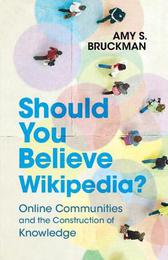
|
Should You Believe Wikipedia?: Online Communities and the Construction of Knowledge
Hardback
Main Details
| Title |
Should You Believe Wikipedia?: Online Communities and the Construction of Knowledge
|
| Authors and Contributors |
By (author) Amy S. Bruckman
|
| Physical Properties |
| Format:Hardback | | Pages:272 | | Dimensions(mm): Height 205,Width 135 |
|
| Category/Genre | Ethical and social aspects of computing |
|---|
| ISBN/Barcode |
9781108490320
|
| Classifications | Dewey:302.231 |
|---|
| Audience | | Professional & Vocational | | General | |
|---|
| Illustrations |
Worked examples or Exercises
|
|
Publishing Details |
| Publisher |
Cambridge University Press
|
| Imprint |
Cambridge University Press
|
| Publication Date |
3 February 2022 |
| Publication Country |
United Kingdom
|
Description
As we interact online we are creating new kinds of knowledge and community. How are these communities formed? How do we know whether to trust them as sources of information? In other words, Should we believe Wikipedia? This book explores what community is, what knowledge is, how the internet facilitates new kinds of community, and how knowledge is shaped through online collaboration and conversation. Along the way the author tackles issues such as how we represent ourselves online and how this shapes how we interact, why there is so much bad behavior online and what we can do about it. And the most important question of all: What can we as internet users and designers do to help the internet to bring out the best in us all?
Author Biography
Amy S. Bruckman is Regents' Professor and Senior Associate Chair in the School of Interactive Computing at the Georgia Institute of Technology where she studies online communities. Bruckman received her Ph.D. from the MIT Media Lab in 1997. She is a Fellow of The ACM and a member of the SIGCHI Academy. She founded her first online community in 1993, and has been teaching the class 'Design of Online Communities' at Georgia Tech since 1998. She currently helps moderate a number of large online communities.
Reviews'This book reminds us of conversations we're not having about online life - with family, friends, with our political representatives - because we don't know where to start. The Internet seems so opaque, that we don't know to get traction on our concern that it no longer serves our human needs. This welcome volume suggests entry points for designers and users - to start those necessary conversations about how to make online life serve our emotional and social purposes. Both scholarly and down-to-earth, filled with compelling examples, it is a textbook for classrooms, dinnertables, and policy discussions.' Sherry Turkle, MIT, Author of The Empathy Diaries, Reclaiming Conversation, Alone Together, and Life on the Screen 'Should you believe Wikipedia? is an extremely useful book about the positive aspects of life online: supportive online communities, social construction of knowledge, online collaboration, the ways online communities can create and harvest social capital, how to safely and productively use Wikipedia, and more. With so much news and speculation about what is wrong about life online, this book from an OG participant and academic expert is a welcome and well-documented argument for all the good things life online can do. I would give it to every high school graduate.' Howard Rheingold, Author of Net Smart and The Virtual Community 'Simply brilliant! Bruckman brings together abstract, sociological and psychological perspectives to articulate a science of online community design. Should You Believe Wikipedia? combines practical skills and theoretical understanding to implement and evaluate the social platforms of the future. This work sets the bar for what students of human-computer interaction need to understand and do to address the societal challenges brought by the ubiquity of online interactions.' Keith N. Hampton, Department of Media and Information, Michigan State University 'From its birth, Amy Bruckman has understood and explained the Net. This book, both practical and theoretical, offers the most mature account that we have of how community online gets made and corrupted. At a moment when the hope of the Internet has faded for so many, this clear and powerful work gives us at least a path back, and a reason to pursue it.' Lawrence Lessig, Harvard Law School 'Ultimately, the effect of reading Should You Believe Wikipedia? is like spending time with the smartest person you know. Bruckman is an excellent guide, and weaves together concepts from diverse sources into a coherent whole ... In this excellent volume, Bruckman provides the background, philosophical tools, and encouragement to allow us to work towards a better world, and that is a gift in itself.' Andrew D. Miller, Computer Supported Cooperative Work
|